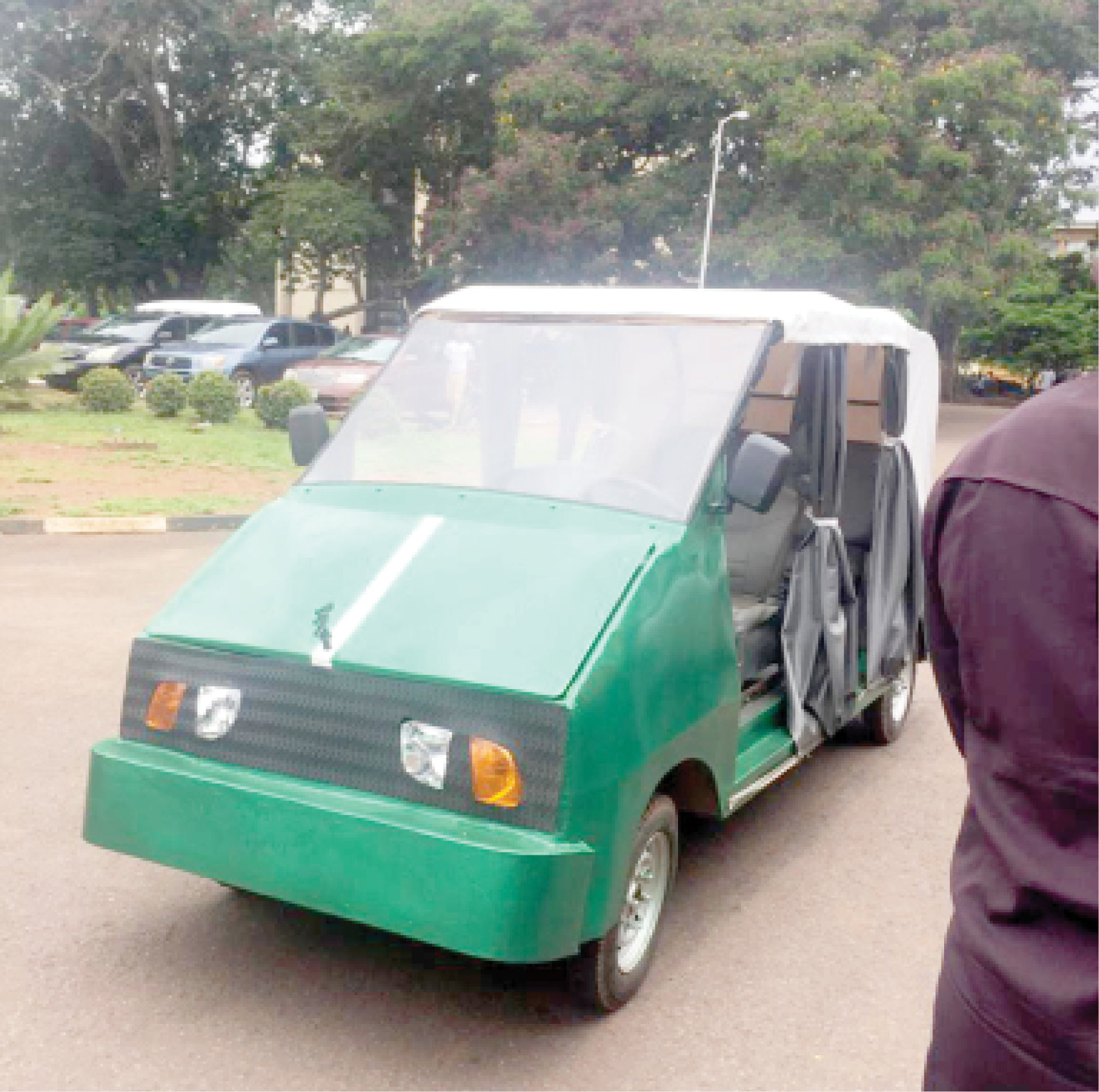How Nigeria’s first electric car was made at UNN
The coordinator of Mechatronic Research Group in the Faculty of Engineering, University of Nigeria, Nsukka (UNN) that produced Nigeria’s first locally made electric car, Engr Ozoemena Ani has given a graphic detail of how the landmark achievement was made. The car named ‘LION Ozumba 551’ was unveiled on Monday at the Nsukka main campus of […]

First electric car produced in the country by the UNN Engineering department
The coordinator of Mechatronic Research Group in the Faculty of Engineering, University of Nigeria, Nsukka (UNN) that produced Nigeria’s first locally made electric car, Engr Ozoemena Ani has given a graphic detail of how the landmark achievement was made.
The car named ‘LION Ozumba 551’ was unveiled on Monday at the Nsukka main campus of the university during a ceremony that attracted dignitaries such as the Director-General of National Automotive Design and Development Council (NADDC) Mr. Jelani Aliyu, who commended the UNN for being the first institution to produce electric car in the country.
Engr Ani, who spoke in an interview with Daily Trust Saturday in his Nsukka office at the university, said the main initiator of the project was the immediate past Vice Chancellor, Prof. Benjamin Chukwuma Ozumba, who challenged and encouraged the researchers to form a team or group in order to come up with an innovation that would impact positively on the society.
Ani, an Associate Professor said: “Sometime in 2015 under the Vice Chancellor, Prof BC Ozumba, he initiated the idea that researchers should work in groups. People of the same kind of interest, should be grouped together so that they can pull their potentials together and be able to harness them for the best impact.
“So they gave the criteria for formation of research group and Mechatronics Research Group was one of the first less than 50 groups that were approved by the university in 2015. One of the things we were told to do as requirements was to explain the research focus of the group. Among so many things listed was electric vehicle. So we have been doing quite a few things in that direction. Before now, different people have been doing different kinds of activities but there was no coordination.
He said the research group bought about 80 percent of the components used in producing the electric vehicle from such places as Onitsha, Nnewi and Nsukka, adding, “And a few of them we bought from China, but many of them we had to construct; redo them so that they will fit into shape.”
Ani recalled that the materials used in producing the electric vehicle cost about “N800,000 excluding labour cost, transport and similar things,” adding, “Mind you, we had to buy many components several times because when we bought a component and it didn’t work or fit in, we discarded it and bought another one and if that one spoils, we bought another one. But if the process is perfected, that kind of thing will be eliminated.”
On a likely synergy with local industries in order to achieve mass production of the vehicle, Ani said there is need for critical collaboration between UNN and INNOSON Vehicle Manufacture (IVM).
He said: “If through the powers of National Automotive Design and Development Council (NADDC) and through the University administration, a good MoU can be signed with Innoson Vehicle Manufacture. Then the Automotive Council will empower us financially and give us the necessary equipment and some grants to perfect our design. Then we can transmit that design to Innoson Vehicle Manufacture for commercialization. We have just demonstrated that we can put something together and make it functional.”
At the unveiling of the ‘Lion Ozumba 551’ Aliyu advised other universities in the country to emulate UNN. “The council is happy that UNN is the first to prepare a paper design and produced electrical car that has been unveiled and test-run today in the university.
The NADDC boss, represented by Director Finance and Account in the council Mr David Oyetunji, hoped that the growth in automobile industry in the country would help to create more employments and save the nation’s foreign reserves spent in importing cars into the country.
Aliyu said: “NADDC commends UNN, which recently produced the first gasification plant that used organic waste to generate electricity and today the same university is unveiling first electric-built car in the country.”
But the Vice Chancellor (VC) of the university, Prof. Charles Igwe who was visibly excited, said his administration would continue to give innovation and technology the highest attention in order to move the university to the next level.
Igwe expressed appreciation to the immediate past VC of UNN, Prof. Benjamin Ozumba, who, he said, laid the foundation for innovation and technology in the institution.“I feel happy that I inherited strong institution from Ozumba and I promised I will consolidate on his numerous achievements.I commend the Engineering Faculty for making the university proud and naming the car after Ozumba, who ignited the fire of innovation and technology in the university.I also commend NADDC for its encouragement as well as giving UNN a chance to show its potential.”
Past vice chancellor of UNN, Prof Ozumba, said he was overwhelmed with joy when he received the invitation for the unveiling of the electric car, which was initiated by his administration. “When I came on board, I said we need innovation and technology to be at par with China, U.S, Sweden and other developed countries of the world.That’s why I provided the resources and encouragement for innovations and technology because I believe that is one of the ways we can improve our country’s economy,” he said.
